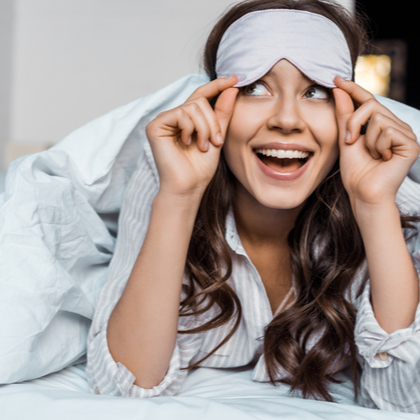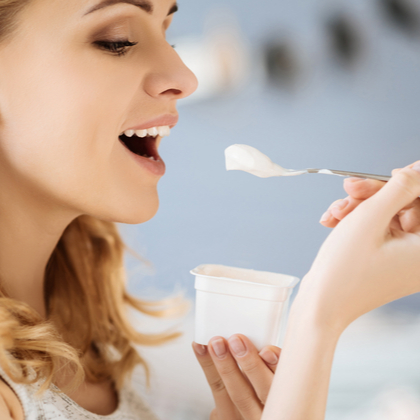
Quality rest can be difficult to achieve, but there are some things you can do if you are struggling to get a good night’s sleep. Besides exercising correctly, making the right dietary choices, and prioritising mindfulness and relaxation before bed, supplementation is another way you can improve your sleep. However, with so many supplements on the market, as well as confusing and often conflicting nutritional advice, it can be hard to know what products to chose.
Here, we break down the best natural aids for sleep. Distilling the science and research, this article will help you find the most suitable supplements to promote quality sleep.
Magnesium
A mineral involved in hundreds of biological processes, magnesium supports sleep by activating the parasympathetic nervous system, which is responsible for helping you feel relaxed.i Magnesium also increases the level of gamma-aminobutyric acid (GABA) — a neurotransmitter that quiets nerve activity and promotes overall calmness.ii Because of these properties, magnesium is widely recognised as a key nutrient supporting the reduction of anxiety, which can often be a factor disrupting your sleep hygiene.iii
Beyond this, empirical data suggests magnesium can help to regulate the production of melatonin.iv Melatonin is the body’s sleep hormone and plays a critical role in governing the circadian cycle. Compelling research suggests inadequate magnesium reserves may lead to disturbed sleep and insomnia.v
Valerian Root
Valerian root contains compounds that can promote relaxation, reduce mild anxiety, and improve sleep quality. Like magnesium, valerian root is thought to support rest due to its interaction with GABA. Studies have found that valerenic acid inhibits the breakdown of GABA in the brain, thereby inducing feelings of calm.vi Notably, low GABA levels are often associated with poor sleep, chronic stress, and anxiety.vii
Alongside this, valerian root is comprised of antioxidants with sleep-enhancing properties, linarin and hesperidin.viii Several studies have revealed that valerian root can reduce the amount of time it takes to fall asleep, as well as improve sleep quality.ix
5-HTP
Since 5-HTP plays a key role in creating serotonin — another essential hormone for the sleep-wake cycle.x Like melatonin, serotonin helps to regulate the body’s 24-hour circadian rhythm and sleep-wake cycles, preparing the body for quality sleep.
Research also suggests that 5-HTP may increase sleep amounts and reduce the time it takes to fall asleepxi, which could be hugely beneficial for insomniacs.
Tart cherry juice
Cherry juice has demonstrated immense promise in supporting sleep because of its role in the production of melatonin. A 2012 study highlighted that subjects who consumed two daily servings of tart cherry juice experienced increased sleep efficiency and sleep time than their placebo-taking counterparts.xiii
In fact, experts have recently learned that drinking two daily glasses of tart cherry juice could extend sleep by 84 minutes each night, proving especially useful for anyone suffering from insomnia.xiv
Theanine and Lemon Balm
A growing body of research suggests L-theanine can improve sleep quality by promoting relaxation and lowering anxiety. Not only does this amino acid increase levels of the neurotransmitters serotonin and dopamine, but also GABA.xv These chemicals help to regulate emotions and mood, which encourage the relaxation needed for sleep.
Crucially, L-theanine improves the quality of sleep by fostering a state of calm.xvi A 2019 study found that participants with generalised anxiety disorder reported greater sleep satisfaction after taking 450-900mg of L-theanine daily for 8 weeks.xvii
As with L-theanine, lemon balm is also widely recognised for its relaxing and calming properties, helping prepare the body for rest. In one study, researchers discovered that children who took both lemon balm and valerian improved symptoms of insomnia by 70-80 per cent.xviii Together, L-theanine and lemon balm are a powerful relaxation aid and encourage quality sleep.
St John’s Wort
Traditionally used to manage symptoms of anxiety and low mood, St John’s Wort may also promote quality rest by influencing the brain chemistry involved in the sleep-wake cycle.ixix
Much like 5-HTP, experts surmise St John’s Wort can aid sleep by elevating levels of serotonin in the body, which can have a positive effect on levels of the sleep hormone, melatonin.xx Despite this, more research is needed to substantiate the evidence that St John’s Wort can improve sleep quality.
To determine which of these supplements can support your needs, it’s worth interrogating why your sleep hygiene needs improving.
If anxiety, stress, depression or hormonal fluctuations are causing sleep troubles, magnesium, Theanine and lemon balm, or valerian root are good choices to relax the body and prepare it for rest. If however, jet-lag or rotational shift-work have skewed your circadian rhythm, tart cherry juice may prove more useful.
Ultimately, it’s important to find a combination that caters for your individual sleep requirements. You can learn more about how to improve your sleep, as well as common sleep disorders, by exploring the rest of our sleep health resources.
References:
-
de Baaij. J., Hoenderop. J. & Bindels. R.(2015). Magnesium in Man: Implications for Health and Disease. Physiological Reviews. 95(1), 1-46.
-
Abdou. A., Higashiguchi. A., Horie. K., Kim. M., Hatta. H. & Yokogoshi. H. (2006). Relaxation and immunity enhancement effects of γ-Aminobutyric acid (GABA) administration in humans. BioFactors. 26(3), 201-208.
-
The Effects of Magnesium Supplementation on Subjective Anxiety and Stress—A Systematic Review. (2017). Nutrients. 9(5), 429.
-
Durlach. J., et al. (2002). Biorhythms and possible central regulation of magnesium status, phototherapy, darkness therapy and chronopathological forms of magnesium depletion. Magnes Res. 15(1-2), 49-66.
-
Boomsma. B. (2008). The magic of magnesium. Int J Pharm Compdy. 12(4), 306-9.
-
Benke. D., Barberis. A., Kopp. S., Altmann. K., Schubiger. M., Rudolph. K., Vogt. U. & Möhler. H. (2009). GABAA receptors as in vivo substrate for the anxiolytic action of valerenic acid, a major constituent of valerian root extracts. Neuropharmacology. 56(1), 174-181.
-
Ballenger. J. (2012). Effect of Acute Psychological Stress on Prefrontal GABA Concentration Determined by Proton Magnetic Resonance Spectroscopy. Yearbook of Psychiatry and Applied Mental Health. 2012,313.
-
Fernández. S., Wasowski. C., Paladini. A. & Marder. M. (2004). Sedative and sleep-enhancing properties of linarin, a flavonoid-isolated from Valeriana officinalis. Pharmacology Biochemistry and Behavior. 77(2), 399-4041.
-
Taavoni. S., Nazem ekbatani. N., Paladini. A. & Haghani. H. (2013). Valerian/lemon balm use for sleep disorders during menopause. Complementary Therapies in Clinical Practice. 19(4), 193-196. Taavoni. S., Ekbatani. N., Kashaniyan. M. & Haghani. H. (2011). Effect of valerian on sleep quality in postmenopausal women. Menopause. 18(9), 951-955.
-
Psychology Today. (2019). Better Sleep with 5-HTP. Available online: https://www.psychologytoday.com/gb/blog/sleep-newzzz/201710/better-sleep-5-htp
-
Hong. K., Park. Y. & Suh. H. (2016). Sleep-promoting effects of a GABA/5-HTP mixture: Behavioral changes and neuromodulation in an invertebrate model. Life Sciences. 150, 42-49.
-
Pigeon. W., Carr. M., Gorman. C. & Perlis. M.(2010). Effects of a Tart Cherry Juice Beverage on the Sleep of Older Adults with Insomnia: A Pilot Study. Journal of Medicinal Food. 113(3), 579-583.
-
Howatson. G., Bell. P., Tallent. J., Middleton. B., McHugh. M. & Ellis. J. (2011). Effect of tart cherry juice (Prunus cerasus) on melatonin levels and enhanced sleep quality. European Journal of Nutrition. 51(8), 909-916.
-
Losso. J., Finley. J., Karki. N., Liu. A., Predente. A., Tipton. R., Yu. Y. & Greenway. F. (2016). Pilot Study of the Tart Cherry Juice for the Treatment of Insomnia and Investigation of Mechanisms. American Journal of Therapeutics. 25(2), e194-e201.
-
Williams. J., Kellett. J., Roach. P., McKune. A., Mellor. D., Thomas. J. & Naumovski. N. (2016). l-Theanine as a Functional Food Additive: Its Role in Disease Prevention and Health Promotion. Beverages. 2(2), 131.
-
Psychology Today. (2019). What You Need to Know About L-theanine. Available online: https://www.psychologytoday.com/gb/blog/sleep-newzzz/201708/what-you-need-know-about-l-theanine
-
Sarris. J., et al. (2019). L-theanine in the adjunctive treatment of generalized anxiety disorder: A double-blind, randomised, placebo-controlled trial. Journal of Psychiatric Research. 110, 31-37.
-
Müller. S. & Klement. S.. (2006). A combination of valerian and lemon balm is effective in the treatment of restlessness and dyssomnia in children. Phytomedicine. 13(6), 383-387.
-
NCCIH. (2019). Questions and Answers: A Trial of St. John's Wort (Hypericum perforatum) for the Treatment of Major Depression. Available online: https://nccih.nih.gov/news/2002/stjohnswort/q-and-a.htm Mind.org.uk. (2019). Available online: https://www.mind.org.uk/media/715755/making-sense-of-st-johns-wort-2014.pdf
-
Schulz. H. & Jobert. M.. (1994). Effects of Hypericum Extract on the Sleep EEG in Older Volunteers. Journal of Geriatric Psychiatry and Neurology. 7(1_suppl), 39-43.
Related Posts

Olivia
Olivia Salter has always been an avid health nut. After graduating from the University of Bristol, she began working for a nutritional consultancy where she discovered her passion for all things wellness-related. There, she executed much of the company’s content marketing strategy and found her niche in health writing, publishing articles in Women’s Health, Mind Body Green, Thrive and Psychologies.
View More



